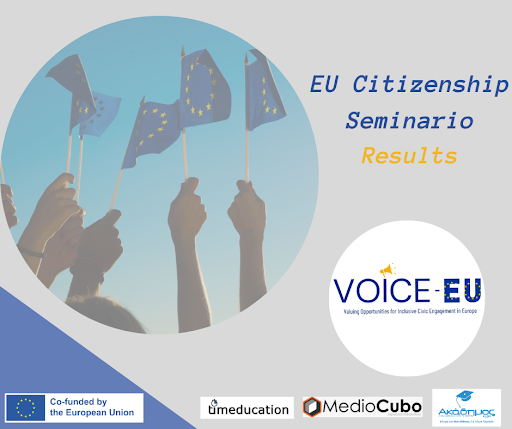
EU Citizenship Seminar: Building Awareness Across Europe
As part of the VOICE-EU initiative (2024-1-IT02-KA210-ADU-000254384), partner organizations across Europe conducted “EU Citizenship” seminars in March-April 2025. The seminars were held in:
- Italy (Aula Consiliare “Pietro Nenni” del Comune di Ciampino Via Quattro Novembre, 91, 00043 Ciampino (RM))
- Greece (Y.M.C.A, Thessaloniki, Greece Nikolaou Germanou 1, Thessaloniki, 546 21)
- Spain (Hotel Leuka Alicante, C.Segura, 23, 03004 Alicante España)
The primary aim was to enhance citizens’ understanding of European institutions and opportunities offered by the EU through an interactive, non-formal educational approach. The seminars focused on promoting active participation, dialogue, and awareness of EU citizenship rights and responsibilities.
The seminars utilized
- Interactive digital tools
- Real-time quizzes
- Expert presentations
- Group discussions
- Non-formal education techniques
Key Topics Covered
- EU Institutions and their functions
- Citizens’ rights and democratic participation
- Environmental policies and sustainability
- Migration and security
- Sports and social inclusion
- Opportunities for EU citizens
The impact of the seminars was substantial and measurable across all participating locations. Pre and post-surveys demonstrated significant improvements in participants’ understanding of EU member states, accession procedures, citizenship rights, European institutions, and EU historical evolution.
Participant engagement and satisfaction levels were consistently high across all locations. Attendees particularly appreciated the interactive methodology and the accessibility of complex content. The seminars succeeded in not only transferring knowledge but also in motivating participants to become more involved in EU affairs. The use of innovative teaching methods proved especially effective in maintaining engagement and facilitating learning.
The coordinated effort across countries resulted in several key achievements, including enhanced understanding of European institutions and citizens’ rights, successful implementation of innovative teaching methods, creation of platforms for active citizenship dialogue, establishment of connections between local communities and EU institutions, and generated interest in future EU initiatives.
The seminars successfully achieved their objectives across all participating countries, demonstrating the effectiveness of local initiatives in building stronger connections between citizens and European institutions. The combination of valuable content and dynamic delivery methods created an accessible, engaging, and useful experience that laid foundations for future initiatives aimed at nurturing a shared European culture. The success of these seminars highlights the importance of continued civic education and engagement in shaping the future of European democracy, while showcasing the value of international cooperation in delivering consistent, high-quality educational experiences across different European contexts.
